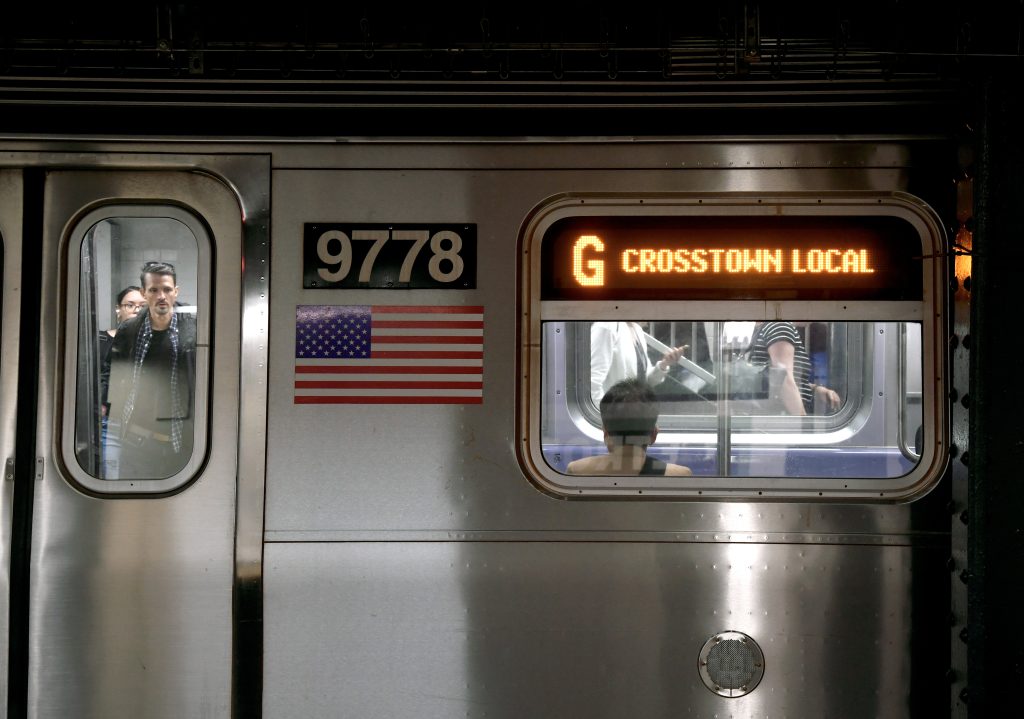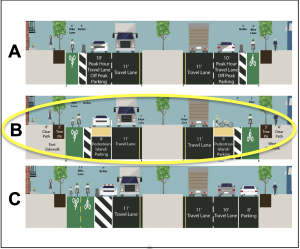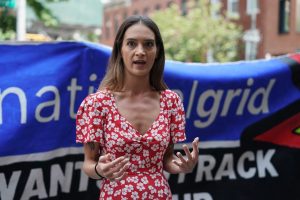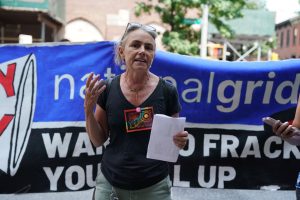Brooklyn Heights Medical Facility Hit with Federal Drug Raid
By Celia Bernhardt

The storefront unit at 142 Joralemon St where a DEA raid took place. Attorneys and locals say this storefront has been the center of quality of life issues plaguing the neighborhood for a year and a half. Credit: Celia Bernhardt
In the middle of a posh, tree-lined block in Brooklyn Heights, one unit in a large medical complex has been hit with a federal Drug Enforcement Agency raid.
The August 14 raid targeted the sole ground-level, storefront unit in the Medical Arts building, a 50-unit commercial co-op consisting mostly of medical offices located at 142 Joralemon Street — just steps away from the prestigious K-12 Packer Collegiate Institute. The raid is part of a larger investigation by the DEA and New York State’s Department of Health.
It was no surprise to local residents, business owners, and other medical practitioners in the building, who say that ever since the storefront facility began operating a year and a half ago, they’ve been distressed by a sharp influx of open drug transaction and use, shoplifting and sometimes violent altercations on their block involving patients of the storefront.
“We knew drugs were involved, but it became dangerous,” Glory Mendez, a receptionist at an ophthalmology practice in the building, said. “The aggression, the yelling, the fighting — it just got bad.”
The storefront is open on Tuesdays, Wednesdays, and Thursdays every week. The venetian blinds that cover its broad windows are always shut. During its three days per week of operation, traffic in and out of the facility is high; patients often have to wait outside on a nearby bench to enter the premises. Locals and attorneys representing the Medical Arts Offices Corporation complain that patients frequently loiter in the area, leave behind trash and take and exchange drugs.
“I’m probably not as uncomfortable as a lot of people, but we have patients that are,” Mendez said. “Most of the building is elderly patients — it’s a lot of specialists. There’s a lot of children, because there’s a lot of after-school and tutoring centers here.”
As part of a state-level litigation process separate from the federal DEA investigation, the Medical Arts building’s management company president, Douglas Rosenberg, described in a December 2023 affidavit his sense of what could be happening within the unit.
“Based on complaints that I have received,” the affidavit reads, “some ‘Doctor’ that is using the Premises under some form of sublet arrangement is dispensing pills to admitted addicts who have engaged in threatening, violent behavior at the Premises and in the Building [sic].”
Mendez recalled witnessing the tail end of the raid while taking a brief break from work.
“The cops were still there, they were moving things outside the little office…They all had bulletproof vests and all that stuff,” Mendez said. “I texted a ton of people upstairs in my office, like ‘Yo, I think they’re getting raided, we’ll finally be free.’”
The DEA declined to comment on the raid, citing an ongoing investigation. An attorney representing the individual who owns the unit told the Star that one employee, Gilbert Charles, was arrested during the raid for distribution of Schedule 2 substances containing fentanyl.
Four weeks later, the facility is still in business.

A picture taken during the August 14 raid. Courtesy of Glory Mendez.
The facility does not currently appear to go by one particular name. Business cards for the location obtained by the Star in August 2024 did not list any title or practitioner, only a list of services — psychiatry, pain management, “Foot Doctor,” and neurology — and two phone numbers. Neither number responded to attempts by the Star to reach them. In its early days of operation, court documents show, multiple signs on the premises advertised it as Fulton Medical Group — a facility which previously operated on 350 Fulton Street (where signs were posted in the window stating that it had indeed moved to the Medical Arts location, documents also show). That sign listed the facility’s services as pain management, psychiatry, “medical doctor/primary care,” podiatry, physical therapy, massage therapy, and gynecology.
The DEA raid marked a significant escalation of legal action and a milestone for concerned neighbors on the block. The storefront’s state-level legal battle, though, has been underway for a year and a half: the Medical Arts Offices corporation has been attempting to terminate the unit shareholder’s lease or force them to remedy alleged violations since early 2023, when the storefront first began operating.
Watching it Happen
Across the street from the Medical Arts building, a steady stream of regulars — students, parents, nurses, a postal worker, old and young neighbors — passed through the Sunny Gourmet Deli on Wednesday, September 4. Deli owner Joe Kim greeted many by name, particularly middle and high school students. He gave out high fives and asked them about the start of the school year as he rang them up.
“I’ve had this store for over 15 years. I know who comes to the neighborhood,” Kim said. “I know everybody, almost.”
Kim and his colleague Dante Espinoza have kept the small and lively deli running for 16 years and 14 years, respectively. They both said that a lot has changed in the past year and a half.
“Ever since that place opened up, it’s bringing a lot of drug addicts to the neighborhood. It brings a lot of drug dealers to the neighborhood. It’s making the street so messy. There’s been times where they did drug deals inside the store. You know when addicts… look they’re about to fall down, but they don’t?” Kim said, referring to the “nodding off” behavior caused by opiates. “They do that a lot in the store. And even outside, they shoot up outside.”
“I’m surrounded by schools,” Kim added. “When [storefront patients] come in here, you hear the most worst profanity ever. They curse at each other, they argue, they fight outside. So it’s not good for the neighborhood.”

Joralemon Street. On the left, the awning for the Medical Arts building, marked 142, is visible. Sunny Gourmet Deli is located in the building second from right. Packer Collegiate Institute is just around the corner. Credit: Celia Bernhardt
Videos from the deli’s security camera are cited multiple times as evidence in the corporation’s litigation against the storefront. The footage documents drug deals, drug use, shoplifting, and more. Some footage also shows the individuals crossing the street to enter the storefront unit after leaving the deli. Pictures of drugs allegedly left behind in the store are also cited.
Kim said the uptick in shoplifting was particularly difficult to manage.
“I get so stressed out because when I’m busy, I don’t have time to look. And then when I go over the video after they leave, they’ve taken something,” Kim said. “So I have to go over there and tell the workers that I don’t want these people in the store.”
In a January 2024 email to Naomi Gardner, president of the Medical Arts Offices corporation, Kim described the ongoing situation as “a traumatic experience” for him and Espinoza.
Mendez, too, said she frequently sees patients using drugs outside her place of work during the day.
“I come outside to smoke, so I see more than anyone else,” Mendez said as she motioned to spots on the sidewalk in front of the Medical Arts building. “Got out of work, there was someone shooting up over here. My manager parked her car right here on this block so we were walking around the corner, and someone was shooting up.”
Mendez said she worries about the impact the situation is having on patients of her own office, who she says are largely elderly.
“They would sometimes have to wait for Access-A-Ride,” Mendez said. “They stopped waiting outside. Now they’ll just ask, ‘Hey, can we wait inside?’ Because no one’s comfortable going out there.”

Joe Kim, left, and Dante Espinoza, right, stand behind the deli counter. Credit: Celia Bernhardt
Mendez said she herself has taken steps to avoid the vicinity while on her breaks. She believes the issue is exacerbated when patients wait outside the facility for long stretches of the day.
“Sometimes they’re great. Some of them — happy as kites. Some of them are upset. It takes a really long time, sometimes the people will be there from morning to mid-afternoon. I’ll get in and it’ll be some of the same people still around. And they’re already frustrated,” Mendez said. “They get kicked out and told to wait outside a lot. And when they’re told to get outside, now they’re upset. And every time they’re upset, God forbid I walk by and someone’s just like, ‘What? What?’”
In Court
The shareholder of the unit, by way of an LLC called SPD 2010, is a physical therapist named Svetlana Kibrik who operates a practice called Tender Touch Physical Therapy PLLC. Kibrik purchased the unit’s shares entirely upfront, without a mortgage, in 2022. Court documents show that she is not licensed to provide either psychiatry, pain management or neurology, three services advertised in the unit’s business cards and previous signage.
Much of the year-and-a-half long legal battle between the Medical Arts Offices Corporation and Kibrik centers on the obscured nature of who is actually operating the storefront unit. Kibrik’s own attorney in an April 2023 letter to the co-op’s attorney stated that another practitioner — LC Nurse Practitioner Psychiatry Services LP (LCNP) — was also operating in the unit. The co-op’s counsel argued in December 2023 that this was a sublease in practice, violating the terms of Kibrik’s lease. Attorneys later identified LCNP as belonging to a practitioner who goes by the names Leslie Curtis and Lesly Curtis.
In February, two months after the corporation’s attorney submitted that argument, Kibrik’s counsel requested to be relieved of representing her, citing “irreconcilable differences and disagreement on legal strategy” and a “fundamental breakdown of the client/attorney relationship.”

The Medical Arts Building. Credit: Celia Bernhardt
Medical Arts has been unable to simply evict Kibrik in large part because she filed for a Yellowstone Injunction — a protective legal mechanism commercial tenants can invoke after their landlord gives them a deadline to cure a lease default, which can restrain the landlord from moving forward with any eviction proceedings until the court itself can determine whether a default exists.
This has left the corporation under a temporary restraining order since November as litigation moves forward. In the meantime, Kibrik has not been made available for a deposition; the corporation’s attorney argues that this is an intentional move to stall legal consequences.
“Despite the passage of seven (7) months, for various reasons that have not been corroborated or documented by Kibrik’s counsel, Kibrik continues to be, purportedly, unavailable to complete her deposition,” the corporation’s attorney wrote in a memorandum in late July. “Clearly, SPD and Kibrik are using this stay to actively prevent the Corporation from obtaining evidence that will fully expose SPD’s continued, material breaches of the Lease.”
Neither Kibrik’s nor the corporation’s attorneys for this case responded to requests for comment by press time.
An attorney named Igor Niman currently represents Kibrik with respect to the DEA’s August 14 raid exclusively. When asked what kind of business Kibrik operates at the storefront unit, Niman said “she operates a pain management clinic and basically there are other offices like psychiatrists and maybe some other doctors, but I’m not sure what other doctors besides psychiatrists and pain management.”
When asked whether he himself was aware of any misuse of prescriptions at the location, Niman said “definitely not.”
“Basically, my client operates a legitimate business, and that’s our position. She is not aware of anything,” Niman said. “In terms of that somebody’s selling something or somebody’s doing any type of illegal activity, she’s definitely not aware.”

A picture of a bench just outside the storefront unit, where patients often congregate, taken on Tuesday, July 18 2023. Increased litter is one of the many complaints local residents have about the facility’s presence. Courtesy of Jane McGroarty, who lives next door to the facility.
The Medical Arts Offices corporation’s legal documents, spanning the past year and a half, describe a litany of other allegedly drug-related harms surrounding the unit’s operation.
A timeline of incidents filed as an exhibit in late July cited multiple incidents of violent altercations. An arrest was made after one of the facility “regulars” brandished a gun in an argument on the sidewalk. A video posted to the Citizen app showed a security guard for the facility punching someone to the ground. Written concerns from neighbors, incidents of vandalism, and a “menacing” confrontation between an individual entering the store at night and Gardner were also listed.
In a July 2024 affidavit, Gardner wrote about the facility’s potential negative financial impacts on the building’s co-op.
“Before SPD became a shareholder, the Corporation’s shareholders never feared for their own personal safety because of another shareholder’s use and occupancy of the premises,” the document reads. “The ongoing incidents at the Store Premises [sic] have affected other business negatively, and I have been approached by certain shareholders who stated that they are considering selling their units and moving their practices from the Building [sic] due to the ongoing objectionable activities occurring in the Store Premises.”
In Business — For Now
On Thursday, September 5, the unit’s waiting room was busy. At least a dozen patients filled the room at all times; several entered and several left within five minutes.
When asked by the Star for a description of what the unit is used for, a front desk worker named Natasha, who declined to give her last name, replied, “You’ll have to ask the office manager. I can’t say anything.” Natasha identified the office manager as Galina, saying she did not know her last name, and provided the Star with an email to contact her.
Galina did not respond to emailed requests for comment from the Star by press time.
A security guard for the storefront who identified himself as Philip but declined to give a last name told the Star that he worked only occasionally for the property. When asked if he was aware of the recent DEA raid or any ongoing issues with drug use and exchange, he said he was not.
“My duty is just to look after this entrance and if I see someone smoking, or something happens, I have to report it to Galina,” Philip said.

A window in the storefront unit. Credit: Celia Bernhardt
Both Kim and Danielle Jenkins, an employee in the Medical Arts building, said they had been excited to witness the raid in mid-August. Jenkins said she rushed into the deli to talk to Kim when it happened.
“I was jumping up and down,” Kim laughed.
“When the cops came, I came over here, I’m like, ‘Do you see what’s going on out there?’” Jenkins said. “But now they’re back.”
As of press time on Tuesday, Kibrik and Curtis (or their attorney) are set to attend state court in person on September 25 to justify why the court should not void the restraining order that has so far protected them from eviction, deny their motion for a Yellowstone Injunction, and mandate a deposition from both Kibrik and Natasha, the facility’s front desk worker.
“We just want them gone,” Mendez said when asked what she hoped would unfold in the future.
“At this point, it’s not getting any better. It’s gotten better since the raid — but if they stay here, it’s just gonna keep getting worse.”

Joralemon Street. Credit: Celia Bernhardt
































































